牛津译林版(2019)必修第三册 Unit 4 Scientists who changed the world Extended reading 课件(27张ppt)
文档属性
| 名称 | 牛津译林版(2019)必修第三册 Unit 4 Scientists who changed the world Extended reading 课件(27张ppt) | 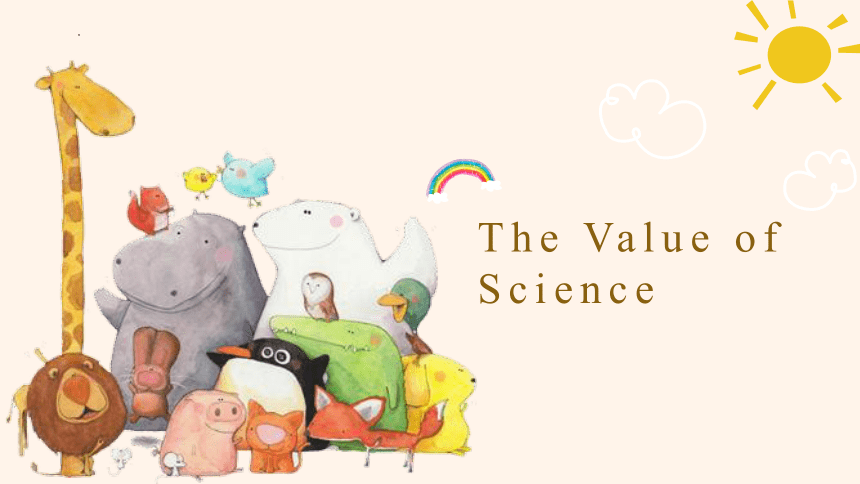 | |
| 格式 | zip | ||
| 文件大小 | 7.0MB | ||
| 资源类型 | 教案 | ||
| 版本资源 | 牛津译林版(2019) | ||
| 科目 | 英语 | ||
| 更新时间 | 2022-12-04 16:32:58 | ||
图片预览

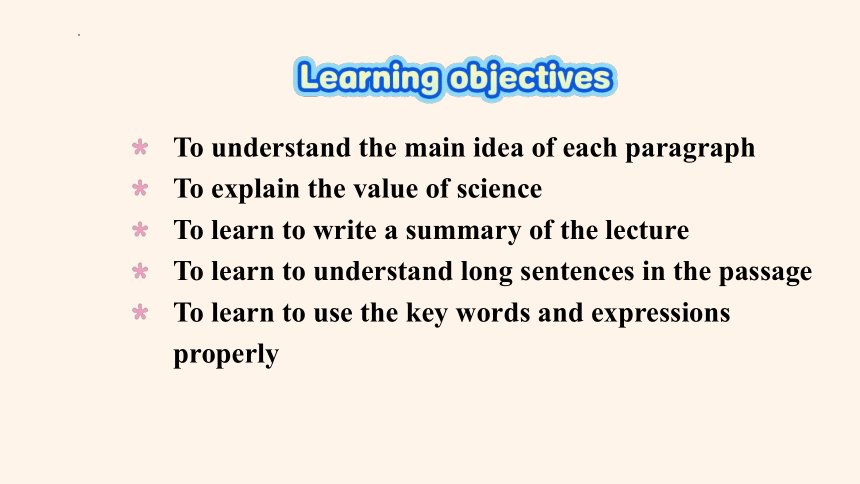

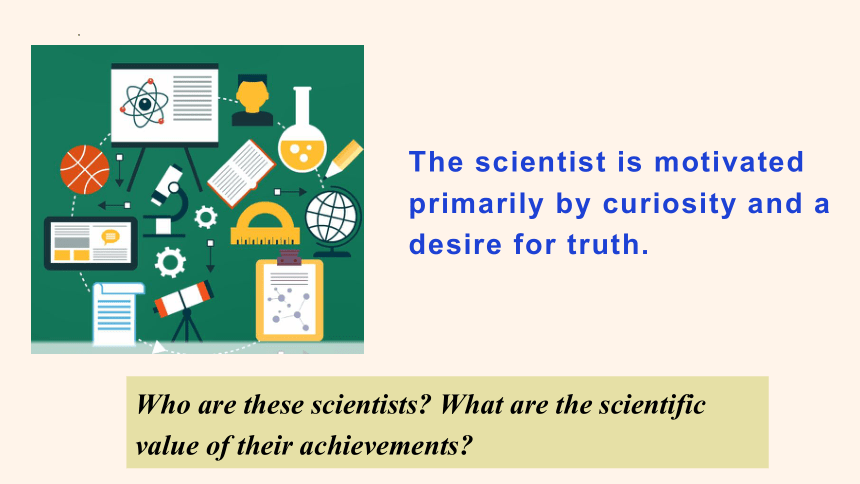


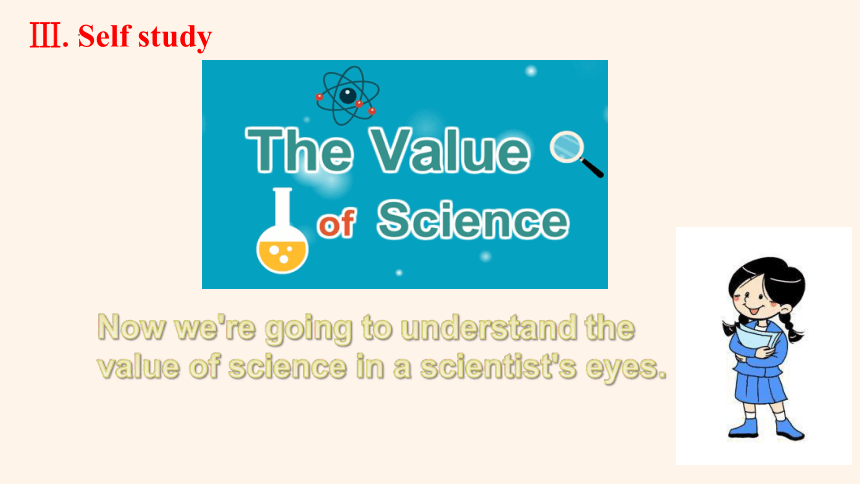
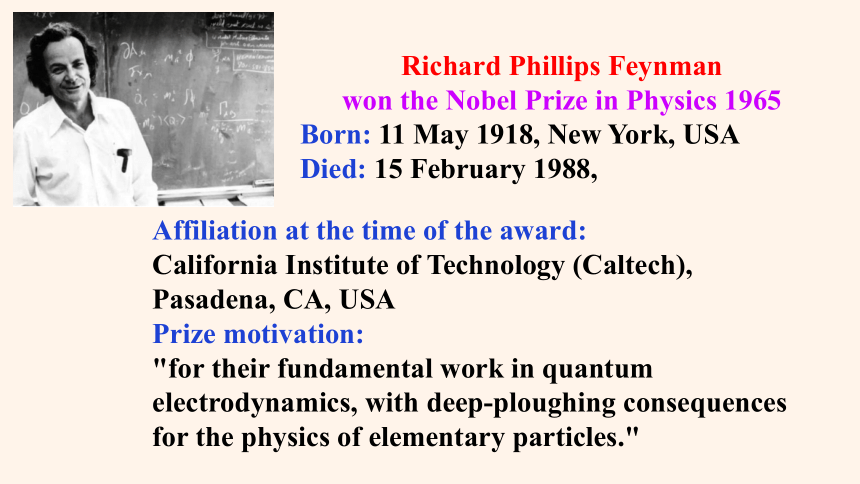
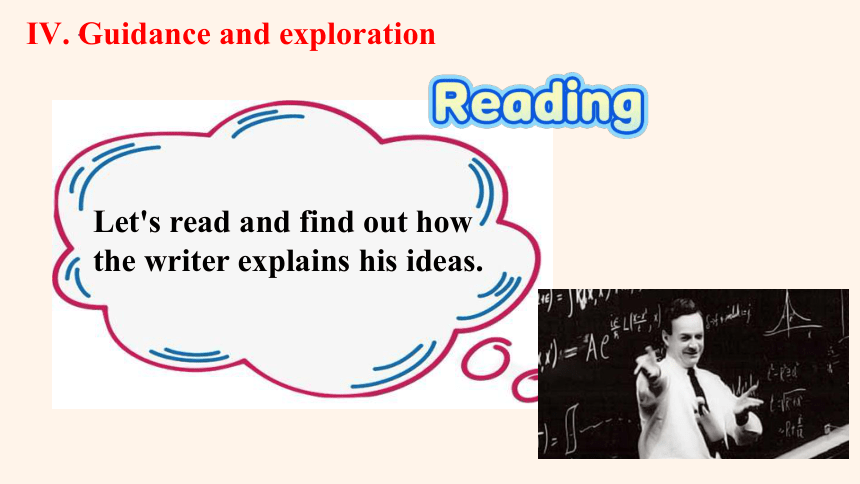
文档简介
(共27张PPT)
The Value of
Science
To understand the main idea of each paragraph
To explain the value of science
To learn to write a summary of the lecture
To learn to understand long sentences in the passage
To learn to use the key words and expressions properly
What's the importance of science
Ⅰ.Lead in
The scientist is motivated primarily by curiosity and a desire for truth.
Who are these scientists What are the scientific value of their achievements
Tu Youyou
Discovery of a medicine against malaria
Yuan Longping
Father of hybrid rice
Marie Curie
Discovery of Radium
Steven Hawking
English physicist
A Brief History of Time
Now we're going to understand the value of science in a scientist's eyes.
Ⅲ.Self study
Affiliation at the time of the award:
California Institute of Technology (Caltech), Pasadena, CA, USA
Prize motivation:
"for their fundamental work in quantum electrodynamics, with deep-ploughing consequences for the physics of elementary particles."
Richard Phillips Feynman
won the Nobel Prize in Physics 1965
Born: 11 May 1918, New York, USA
Died: 15 February 1988,
Let's read and find out how the writer explains his ideas.
Ⅳ. Guidance and exploration
Scientific knowledge enables us to do and make all kinds of things.
Science can provide us with intellectual enjoyment.
Scientists have the freedom to doubt.
to demand this freedom as our duty to all coming generations
__________________________________________________________
__________________________________________________________
__________________________________________________________
to declare the value of this
freedom
to teach how doubt is not to be feared but to be welcomed and discussed
Para Lecture structure Checking for understanding questions Key information
Para. 1 Raise the question Why did he ask such a question
Para. 2 What was his attitude to the question
Para. 3 ___________ What is the first value
Para. 4 What is the second value
Para. 5 What is the third value
Para. 6
Para. 7 Emphasize ___________ What are the responsibilities
Answer the question
responsibility
A
Write a summary of the lecture transcript. Use the following ideas to help you.
His personal experience
His ideas on the value of science
How to write a summary
We analyze the structure of the passage and find out the ways that the writer shows his/her ideas. Tick out the main points to make up your summary with concise words.
Possible answer:
When Richard Feynman was young, he thought the only use for science was to make good things for people. However, after he worked on the atomic bomb, he realized that science could also be used for evil. He wondered what the value of science really was and he decided on three values. The first value is that scientific knowledge enables us to do and make all kinds of things. The second is the intellectual enjoyment it can provide us with. And the third value is scientists
freedom to doubt.
Analyse the language of the lecture
Paras. 1 & 2 Find out words or phrases negative in meaning.
Para. 3 What do these “it” refer to
making good things
scientific knowledge
Para. 4 Find out words or phrases positive in meaning.
Para. 5–6 In what way did Richard talk about the third value of science
It is our responsibility as scientists, knowing the great progress that is the fruit of freedom of thought, to declare the value of this freedom; to teach how doubt is not to be feared but to be welcomed and discussed; and to demand this freedom as our duty to all coming generations.
Para. 7 What rhetorical device is used in the last paragraph What effect does it have
The parallel structure is applied here with the use of three to-infinitives. It has a powerful effect to make the audience aware of the significance of the freedom of thought and the value of doubt.
When I was younger , I thought science would make good things for everybody . It was obviously useful ; it was good . But then during the war I worked on the atomic bomb . This result of science was obviously very serious - it represented the destruction of people and it put our future at risk . I had to ask myself ,“ Is there some evil involved in science ”
work on 从事于
get/be involved in 被卷入..之中
take sth seriously 重视,认真对待
Put another way , what is the value of the science I had long devoted myself to - the thing I had loved - when I saw what terrible things it could do It was a question I had to answer . I thought long and hard about this question , and I will try to answer it in this talk .
put another way换句话说=in other words
devote oneself to 致力于
The first way in which science is of value is familiar to everyone : scientific knowledge enables us to do and make all kinds of things . Of course , if we make good things , it is not only to the credit of science ; it is also to the credit of the moral choice which led us to good work . Scientific knowledge is an enabling power to do either good or bad - but it does not carry instructions on how to apply it . Such power has obvious value - even though the power may be negated by what one does with it .
familiar (adj)熟悉的--familiarity (n)熟悉,通晓
sth be familiar to sb 某物为某人所熟悉
sb be familiar with sth 某人对某物很熟悉
enable sb to do sth 使某人能够做某事
all kinds of/all sorts of/various/diverse 各种各样的
not only.....but also......不但....而且
to the credit of 归功于
Another value of science is the intellectual enjoyment it can provide us with . When we look at any question deeply enough , we feel the excitement and mystery coming to us again and again . With more knowledge comes a deeper , more wonderful mystery , inspiring one to look deeper still . Never concerned that the answer may let us down , with pleasure and confidence we turn over each new stone to find unimagined strangeness leading on to more wonderful questions and mysteries . Thanks to the scientific effort , we have been led to imagine all sorts of things more fantastic than poets and dreamers of the past ever could .
提供某人某物
provide sb with sth=provide sth for sb
offer sb sth=offer sth to sb
let sb down 使某人失望
thanks to 多亏,幸亏,由于
I would now like to turn to a third value that science has . The scientist has a lot of experience with ignorance and doubt and uncertainty , and this experience is of very great importance . When a scientist doesn ' t know the answer to a problem , he is ignorant . When he has an idea as to what the result is , he is uncertain . And when he is pretty sure of what the result is going to be , he is still in some doubt .
想要做某事
would like to do sth
feel like doing sth
turn to 转向,向某人求助
ignore (v)忽视---ignorant (adj) 无知的,愚昧的--ignorance (n) 无知,愚昧
be of +名词=adj
as to 关于,至于
doubt (n/v)怀疑--doubtful (adj) 怀疑的
There is no doubt that ....... 毋庸置疑
Now , we scientists take it for granted that it is perfectly possible to live and not know . But our freedom to doubt was born out of a deep and strong struggle against authority in the early days of science . In order to progress , we must not forget the importance of this struggle ; we must recognize our ignorance and leave room for doubt . Permit us to question - to doubt - to not be sure .
take it for granted 想当然地认为,认为
in order to do sth 为了做某事
permit (v) 准许,许可 (n)许可证,执照
permit doing sth允许做某事
It is our responsibility as scientists , knowing the great progress that is the fruit of freedom of thought , to declare the value of this freedom ; to teach how doubt is not to be feared but to be welcomed and discussed ; and to demand this freedom as our duty to all coming generations .
( Adapted from a public lecture by Richard Feynman , an American scientist who won the Nobel Prize in Physics in 1965)
The Value of
Science
To understand the main idea of each paragraph
To explain the value of science
To learn to write a summary of the lecture
To learn to understand long sentences in the passage
To learn to use the key words and expressions properly
What's the importance of science
Ⅰ.Lead in
The scientist is motivated primarily by curiosity and a desire for truth.
Who are these scientists What are the scientific value of their achievements
Tu Youyou
Discovery of a medicine against malaria
Yuan Longping
Father of hybrid rice
Marie Curie
Discovery of Radium
Steven Hawking
English physicist
A Brief History of Time
Now we're going to understand the value of science in a scientist's eyes.
Ⅲ.Self study
Affiliation at the time of the award:
California Institute of Technology (Caltech), Pasadena, CA, USA
Prize motivation:
"for their fundamental work in quantum electrodynamics, with deep-ploughing consequences for the physics of elementary particles."
Richard Phillips Feynman
won the Nobel Prize in Physics 1965
Born: 11 May 1918, New York, USA
Died: 15 February 1988,
Let's read and find out how the writer explains his ideas.
Ⅳ. Guidance and exploration
Scientific knowledge enables us to do and make all kinds of things.
Science can provide us with intellectual enjoyment.
Scientists have the freedom to doubt.
to demand this freedom as our duty to all coming generations
__________________________________________________________
__________________________________________________________
__________________________________________________________
to declare the value of this
freedom
to teach how doubt is not to be feared but to be welcomed and discussed
Para Lecture structure Checking for understanding questions Key information
Para. 1 Raise the question Why did he ask such a question
Para. 2 What was his attitude to the question
Para. 3 ___________ What is the first value
Para. 4 What is the second value
Para. 5 What is the third value
Para. 6
Para. 7 Emphasize ___________ What are the responsibilities
Answer the question
responsibility
A
Write a summary of the lecture transcript. Use the following ideas to help you.
His personal experience
His ideas on the value of science
How to write a summary
We analyze the structure of the passage and find out the ways that the writer shows his/her ideas. Tick out the main points to make up your summary with concise words.
Possible answer:
When Richard Feynman was young, he thought the only use for science was to make good things for people. However, after he worked on the atomic bomb, he realized that science could also be used for evil. He wondered what the value of science really was and he decided on three values. The first value is that scientific knowledge enables us to do and make all kinds of things. The second is the intellectual enjoyment it can provide us with. And the third value is scientists
freedom to doubt.
Analyse the language of the lecture
Paras. 1 & 2 Find out words or phrases negative in meaning.
Para. 3 What do these “it” refer to
making good things
scientific knowledge
Para. 4 Find out words or phrases positive in meaning.
Para. 5–6 In what way did Richard talk about the third value of science
It is our responsibility as scientists, knowing the great progress that is the fruit of freedom of thought, to declare the value of this freedom; to teach how doubt is not to be feared but to be welcomed and discussed; and to demand this freedom as our duty to all coming generations.
Para. 7 What rhetorical device is used in the last paragraph What effect does it have
The parallel structure is applied here with the use of three to-infinitives. It has a powerful effect to make the audience aware of the significance of the freedom of thought and the value of doubt.
When I was younger , I thought science would make good things for everybody . It was obviously useful ; it was good . But then during the war I worked on the atomic bomb . This result of science was obviously very serious - it represented the destruction of people and it put our future at risk . I had to ask myself ,“ Is there some evil involved in science ”
work on 从事于
get/be involved in 被卷入..之中
take sth seriously 重视,认真对待
Put another way , what is the value of the science I had long devoted myself to - the thing I had loved - when I saw what terrible things it could do It was a question I had to answer . I thought long and hard about this question , and I will try to answer it in this talk .
put another way换句话说=in other words
devote oneself to 致力于
The first way in which science is of value is familiar to everyone : scientific knowledge enables us to do and make all kinds of things . Of course , if we make good things , it is not only to the credit of science ; it is also to the credit of the moral choice which led us to good work . Scientific knowledge is an enabling power to do either good or bad - but it does not carry instructions on how to apply it . Such power has obvious value - even though the power may be negated by what one does with it .
familiar (adj)熟悉的--familiarity (n)熟悉,通晓
sth be familiar to sb 某物为某人所熟悉
sb be familiar with sth 某人对某物很熟悉
enable sb to do sth 使某人能够做某事
all kinds of/all sorts of/various/diverse 各种各样的
not only.....but also......不但....而且
to the credit of 归功于
Another value of science is the intellectual enjoyment it can provide us with . When we look at any question deeply enough , we feel the excitement and mystery coming to us again and again . With more knowledge comes a deeper , more wonderful mystery , inspiring one to look deeper still . Never concerned that the answer may let us down , with pleasure and confidence we turn over each new stone to find unimagined strangeness leading on to more wonderful questions and mysteries . Thanks to the scientific effort , we have been led to imagine all sorts of things more fantastic than poets and dreamers of the past ever could .
提供某人某物
provide sb with sth=provide sth for sb
offer sb sth=offer sth to sb
let sb down 使某人失望
thanks to 多亏,幸亏,由于
I would now like to turn to a third value that science has . The scientist has a lot of experience with ignorance and doubt and uncertainty , and this experience is of very great importance . When a scientist doesn ' t know the answer to a problem , he is ignorant . When he has an idea as to what the result is , he is uncertain . And when he is pretty sure of what the result is going to be , he is still in some doubt .
想要做某事
would like to do sth
feel like doing sth
turn to 转向,向某人求助
ignore (v)忽视---ignorant (adj) 无知的,愚昧的--ignorance (n) 无知,愚昧
be of +名词=adj
as to 关于,至于
doubt (n/v)怀疑--doubtful (adj) 怀疑的
There is no doubt that ....... 毋庸置疑
Now , we scientists take it for granted that it is perfectly possible to live and not know . But our freedom to doubt was born out of a deep and strong struggle against authority in the early days of science . In order to progress , we must not forget the importance of this struggle ; we must recognize our ignorance and leave room for doubt . Permit us to question - to doubt - to not be sure .
take it for granted 想当然地认为,认为
in order to do sth 为了做某事
permit (v) 准许,许可 (n)许可证,执照
permit doing sth允许做某事
It is our responsibility as scientists , knowing the great progress that is the fruit of freedom of thought , to declare the value of this freedom ; to teach how doubt is not to be feared but to be welcomed and discussed ; and to demand this freedom as our duty to all coming generations .
( Adapted from a public lecture by Richard Feynman , an American scientist who won the Nobel Prize in Physics in 1965)
同课章节目录
- Unit 1 Nature in the balance
- Welcome to the unit
- Reading
- Grammar and usage
- Integrated skills
- Extended reading
- Project
- Unit 2 Natural disasters
- Welcome to the unit
- Reading
- Grammar and usage
- Integrated skills
- Extended reading
- Project
- Unit 3 The world online
- Welcome to the unit
- Reading
- Grammar and usage
- Integrated skills
- Extended reading
- Project
- Unit 4 Scientists who changed the world
- Welcome to the unit
- Reading
- Grammar and usage
- Integrated skills
- Extended reading
- Project
